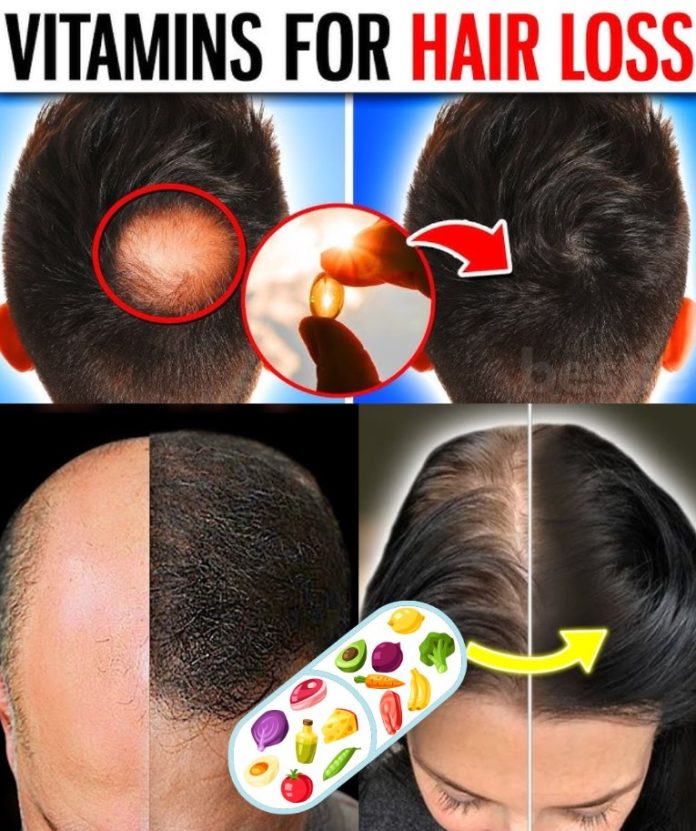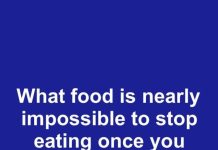Hair loss is a widespread issue that impacts millions globally, transcending age, gender, and ethnicity. It can be triggered by a myriad of factors such as genetics, stress, hormonal fluctuations, or deficiencies in essential nutrients. The emotional toll of losing hair can be significant, leading many to seek effective solutions. Fortunately, incorporating the right vitamins into your diet can fortify hair follicles, stimulate growth, and minimize excessive shedding. In this article, we will explore 10 powerful vitamins that play a crucial role in preventing hair loss and maintaining vibrant, healthy hair.
1. Biotin (Vitamin B7)
Biotin, often hailed as the ultimate hair vitamin, is crucial for maintaining healthy hair. This water-soluble vitamin supports the production of keratin, a key protein that makes up hair strands. A deficiency in biotin can lead to brittle hair, breakage, and increased hair fall. By ensuring adequate biotin intake, you can strengthen your hair shaft and promote resilience.
Sources: Eggs, nuts (especially almonds and walnuts), seeds (like sunflower seeds), sweet potatoes, and bananas are excellent sources of biotin.
How to Incorporate Biotin into Your Diet
To boost your biotin levels, consider starting your day with a hearty breakfast that includes eggs or a smoothie packed with bananas and spinach. Snacking on nuts throughout the day can also provide a convenient source of this vital nutrient.
2. Vitamin A
Vitamin A is essential for maintaining a healthy scalp, as it facilitates the production of sebum, the natural oil that moisturizes hair. However, moderation is key; excessive intake of vitamin A can lead to hair loss. Striking a balance ensures that your scalp remains hydrated and your hair stays nourished.
Sources: Rich sources include carrots, spinach, sweet potatoes, and fish liver oil.
Tips for Balanced Vitamin A Intake
Incorporate colorful vegetables into your meals, such as carrot sticks with hummus or a spinach salad topped with sweet potato. This variety not only enhances your vitamin A intake but also adds essential antioxidants to your diet.
3. Vitamin C
Vitamin C is a powerhouse antioxidant that aids in the absorption of iron, a mineral vital for hair growth. It also promotes collagen production, which strengthens hair strands against damage. A deficiency in vitamin C can lead to hair weakness and increased shedding.
Sources: Citrus fruits, strawberries, bell peppers, and kiwis are excellent sources of vitamin C.
Creative Ways to Consume Vitamin C
Start your day with a refreshing smoothie made with oranges and strawberries, or enjoy a colorful salad topped with bell peppers. Incorporating these foods into your diet can help you meet your daily vitamin C needs while enhancing your hair’s health.
4. Vitamin D
Vitamin D plays a pivotal role in the creation of new hair follicles and has been linked to preventing hair thinning and alopecia. Low levels of vitamin D can lead to hair loss, making it essential to maintain adequate levels.
Sources: Sunlight exposure, fatty fish (like salmon and mackerel), egg yolks, and fortified dairy products.
Maximizing Your Vitamin D Levels
Aim to spend time outdoors to soak up sunlight, which naturally boosts your vitamin D levels. If sunlight exposure is limited, consider incorporating fatty fish into your diet or discussing supplementation with a healthcare professional.
5. Vitamin E
Vitamin E enhances blood circulation to the scalp, ensuring that hair follicles receive essential nutrients. It also acts as an antioxidant, protecting hair from oxidative stress and damage caused by free radicals.
Sources: Nuts, seeds, avocados, and spinach are rich in vitamin E.
Incorporating Vitamin E into Your Routine
Add a handful of almonds or sunflower seeds to your snacks, or use avocado in salads and smoothies. These simple additions can significantly enhance your vitamin E intake.
6. Vitamin B12
Vitamin B12 is crucial for the production of red blood cells, which transport oxygen and nutrients to hair follicles. A deficiency in B12 can result in hair thinning and increased shedding, making it vital for hair health.
Sources: Meat, fish, dairy products, and fortified cereals are excellent sources of vitamin B12.
Ensuring Adequate B12 Intake
For those following a vegetarian or vegan diet, consider fortified foods or supplements to ensure sufficient B12 levels. Including dairy products or eggs can also help meet your daily requirements.
7. Folic Acid (Vitamin B9)
Folic acid is essential for cell division, promoting healthy hair growth. It supports keratin production, making hair stronger and shinier. A deficiency can lead to stunted hair growth and increased brittleness.
Sources: Leafy greens, lentils, citrus fruits, and beans are great sources of folic acid.
Ways to Boost Folic Acid in Your Diet
Incorporate lentil soup into your meals or enjoy a spinach salad topped with citrus dressing. These foods not only provide folic acid but also contribute to overall health.
8. Iron
While not a vitamin, iron is crucial for hair growth. Iron deficiency, often leading to anemia, is a common cause of hair loss, particularly among women. Ensuring adequate iron levels can help prevent hair thinning.
Sources: Red meat, spinach, lentils, and fortified cereals are rich in iron.
Increasing Iron Absorption
Pair iron-rich foods with vitamin C sources to enhance absorption. For example, enjoy a spinach salad with orange slices or add bell peppers to your lentil stew.
9. Zinc
Zinc is vital for tissue growth and repair, including hair follicles. It helps regulate oil production in the scalp, preventing dandruff and hair thinning. A deficiency in zinc can lead to hair loss and a weakened immune system.
Sources: Shellfish, beef, pumpkin seeds, and chickpeas are excellent sources of zinc.
Adding Zinc to Your Diet
Incorporate more zinc-rich foods by enjoying a hearty chili made with beans and beef or snacking on pumpkin seeds. These foods can help support healthy hair growth.
10. Omega-3 Fatty Acids
While not a vitamin, omega-3 fatty acids are essential for maintaining a healthy scalp and preventing inflammation, which can lead to hair loss. These healthy fats nourish hair follicles and promote overall scalp health.
Sources: Fatty fish (like salmon and mackerel), flaxseeds, walnuts, and chia seeds are rich in omega-3 fatty acids.
Simple Ways to Include Omega-3s
Incorporate fatty fish into your weekly meals, or add flaxseeds to smoothies and oatmeal. Snacking on walnuts can also provide a healthy dose of omega-3s.
Conclusion :
Incorporating a balanced diet rich in these essential vitamins and minerals can significantly help prevent hair loss and promote healthier, stronger hair. If you’re experiencing excessive shedding or thinning, it may be beneficial to consult a healthcare professional to assess for underlying deficiencies. By understanding the vital role of these nutrients and making conscious dietary choices, you can take proactive steps toward maintaining your hair’s health and vitality. Remember, nourishing your body from within is key to achieving the luscious locks you desire.










